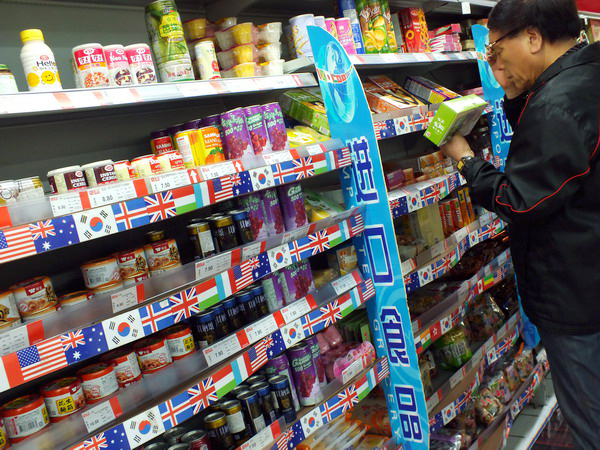Imports gain importance
Updated: 2013-01-17 09:40
By Wang Zhuoqiong and Tang Zhihao (China Daily)
|
||||||||
Owing to recent scares involving the domestic food industry, China's middle class is increasingly turning to imported products, report Wang Zhuoqiong and Tang Zhihao
Xia Lili, the mother of a 1-year-old, is a frequent visitor to the imported food section of supermarkets. In her trolley usually sit products wrapped in packages with foreign names and images, from milk powder and coffee to health products.
"I buy foreign food products not because I'm rich, but because I'm afraid of some domestic food items" said Xia, who manages a department store in Hangzhou, capital of Zhejiang province.
|
 The sales of imported food increased fivefold from 2011 to 2012 at Yihaodian.com, the e-commerce unit of Walmart in China. Experts say the government's efforts to lower tariffs on imported food have made such items more accessible to Chinese customers. [Photo / China Daily] |
"As a mother, you want to provide safe food to your children and family," said Xia, who got her college degree in Singapore. Products made abroad often are of a higher quality, she added.
The preference for international food brands is becoming more obvious among Chinese urban consumers, who have grown increasingly aware of food safety issues, said Gao Jianfeng, general manager of the Shanghai-based Bogo Consultants.
He said imported food - which used to be rare and expensive in supermarkets and department stores - is no longer very pricey.
The recent surge in domestic commodity prices, driven by inflation and higher costs, has made foreign food products more affordable, Gao said.
The government's efforts to lower tariffs on imported food also made such items more accessible to Chinese consumers, said Zhao Ping, deputy director of the department of consumer economics at the Chinese Academy of International Trade and Economic Cooperation of the Ministry of Commerce.
For instance, European cookies used to be considered high-end bakery products, she said. But now small-size bags of those products are sold for about 10 yuan ($1.59).
As a result, sales of imported food are on the rise among large retailers.
At Metro Cash & Carry China, the German self-service wholesale retailer, imported food products make up 15 percent of the food products on offer, having 1,800 items.
Imported food is a crucial and very successful business for Metro China, showing an annual growth rate between 20 and 30 percent and accounting for more than 55 percent of the company's sales in the Asia-Pacific region, said Patricia Spittau, head of the imported food department at Metro China, which operates 63 hypermarkets in 39 cities in China. She said milk, wine and olive oil are among the best sellers.

 Li Na on Time cover, makes influential 100 list
Li Na on Time cover, makes influential 100 list
 FBI releases photos of 2 Boston bombings suspects
FBI releases photos of 2 Boston bombings suspects
 World's wackiest hairstyles
World's wackiest hairstyles
 Sandstorms strike Northwest China
Sandstorms strike Northwest China
 Never-seen photos of Madonna on display
Never-seen photos of Madonna on display
 H7N9 outbreak linked to waterfowl migration
H7N9 outbreak linked to waterfowl migration
 Dozens feared dead in Texas plant blast
Dozens feared dead in Texas plant blast
 Venezuelan court rules out manual votes counting
Venezuelan court rules out manual votes counting
Most Viewed
Editor's Picks

|

|

|

|

|

|
Today's Top News
Boston bombing suspect reported cornered on boat
7.0-magnitude quake hits Sichuan
Cross-talk artist helps to spread the word
'Green' awareness levels drop in Beijing
Palace Museum spruces up
First couple on Time's list of most influential
H7N9 flu transmission studied
Trading channels 'need to broaden'
US Weekly

|

|







